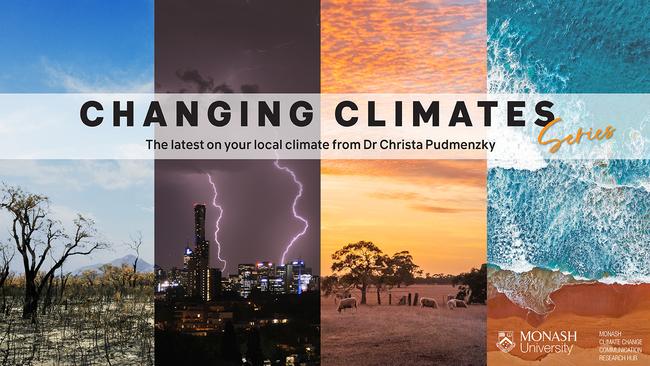Climate change turning up the heat for renters
Host of the Fraser Coast's Changing Climates series, Dr Christa Pudmenzky, explains how our March climate is changing. Plus, hear about how extreme heat impacts renters.

Hyperlocal
Don't miss out on the headlines from Hyperlocal. Followed categories will be added to My News.
Climate change is causing temperatures to rise across Australia.
And we're not immune on the Fraser Coast.
Even our coldest March night is 1.8C warmer than 50 years ago.
While this increase may seem small, even minor changes to our climate can lead to more frequent and intense extreme weather events, including heatwaves.

Aussie renters feeling the heat
Rising temperatures under climate change affect all of us.
The heat influences the way we live in many ways, from the amount of time we spend with the air conditioner on, how frequently our gardens need watering, to whether kids can safely play sport in the middle of the day.
But the 630 thousand people living in rental housing across Queensland are some of those bearing the brunt of it.
According to a study by Better Renting, renters are four-times more likely than homeowners to be uncomfortably hot over the warmer months.
The study shows this is largely due to rental houses lacking access to cooling such as fans and air conditioners, as well as often being energy inefficient and poorly insulated.
It's not uncommon for Aussie renters to be exposed to heat that exceeds safe temperature limits – often soaring above 30C inside for over an hour a day.
And when high temperatures creep into the night like we're seeing on the Fraser Coast there can be further implications including impairment of sleep.
Day or night, heat has consequences for physical health, increasing the risk of dehydration, heat stress and heat stroke.
Those who are elderly, have a disability or chronic illness are most at risk.
Hot temperatures are also known to increase stress and irritability, particularly affecting people who have existing mental health challenges.
Not only that, the prospect of paying high energy bills just to cool a home is stressful for many tenants, and can further exacerbate financial stress, anxiety and depression.
Energy (in)efficiency
Access to air conditioning at home can literally be a life-saver.
However, here we arrive at another climate change catch-22 – while blasting the air conditioning can help us adapt to rising temperatures, it also uses mountains of energy and can contribute to those rising temperatures.
The solution to breaking this cycle lies in energy efficient housing, which can help keep us cool and limit our emissions.
Think double-glazed windows, thickly insulated walls, floors and ceilings, and solar panels on the roof.
Unfortunately, these strategies are easier said than done.
While energy efficiency standards were introduced in Australia in 2003, the requirements for new homes are 40 per cent less rigorous than international standards.
And for rental properties, Australia currently has no minimum energy efficiency requirements.
What we do have is a Nationwide House Energy Rating system.
This is measured on a zero to ten star scale, with the number of stars based on factors including a home's orientation, quality of construction materials, and how well the home is shaded from the sun.
So, a 10-star home would require little to no artificial cooling to keep tenants comfortable.
A recent report found that increasing the energy standards of Australian housing (from six to seven stars) would see a 25 per cent reduction in emissions compared to now.
Keeping cool
As rising greenhouse gas emissions continue to exacerbate climate change, projections show heat in many regions will only worsen.
This knowledge gives us even more reason to put in place mitigation and adaptation strategies that protect us from the summer heat.
Even small adjustments like installing thick curtains can help tenants save money, improve their quality of life, lessen their environmental impact and move from a furnace into temperate tranquillity.

Want more information on how your climate is changing? Check out the last article in this series.
Dr Christa Pudmenzky is a climate scientist at the University of Southern Queensland.
This column is part of a collaboration between Monash University and News Corp to deliver hyperlocal weather and climate information.

